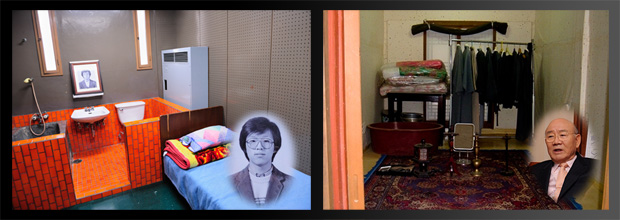Park v Chun, Where They Stayed
On 25th anniversary of the death of student Park Jong-chul
A cell in a police detention centre where a student died from torture. And a cell in a Buddhist temple where a general did his penance.
In stark symbolic contrast, these sites have been associated with key episodes in the struggle against dictatorship and eventual victory of democracy in South Korea.
In one, the victim was Park Jong-chul. A student activist fighting for democracy, he suffocated to death in the cubicle of the then National Police Headquarters complex under interrogation.
In another, cast as the villain was Chun Doo Hwan who ruled with an iron-fist and whose special agents hunted down dissidents, thereby bearing ultimate responsible for Park’s death.
After he was deposed, the strongman secluded himself in a Baekdamsa temple dormitory to repent for his misdeeds. Ironically, both cells have become historical shrines of sorts, drawing visitors who not surprisingly went away with different thoughts and feelings.
Those at Park’s could not shrug off the morbidity of seeing the tub used in his water torture. At Chun’s the visitors seeing the austere room remarked how the high and mighty have been humbled.
Park’s destiny led him to cross swords with Chun who had seized power in a coup following the assassination of President Park Chung-hee.
The confrontation with the man infamous for his violent suppression of the Kwangju Uprising came to a head in late 1980s. Chun’s lockdown on political activities had spawned a clandestine movement of university students who read Marx and disseminated their ideas through samizdat-like publications.
Many students also took up factory jobs as “disguised workers” to link up with the labour unions. Now these left-leaning students faced off with riot police in various university campuses.
It was amid such an explosive atmosphere that Park fell, the first of other student casualties. He was just 21 and headed the student council in the linguistic department at Seoul National University. (Yonsei University student Lee Han-yeol died from head injuries from a tear gas grenade fired by police in subsequent protests.)
Such has been the heavy price exacted from student protesters since the days of President Rhee Seung-man in 1960s. Martyrdom has their lot but each new idealistic generation of youths has not shrunk from.
The intelligentsia’s vanguard role, it is said, springs from Confucian values in Korea culture. Confucianism may preach respect for authority. But when patriarchs abuse their power, the educated class is enjoined to step forward and act as the conscience of the nation.
Park had died for a cause but his cause did not die with him. Shocked by the police brutality, the elites of priesthood and the Press took up his cause. The Catholic Priests Association for Justice (CPAJ) released its account of Park’s torture, and exposed the attempted police cover-up.
Joong-ang Ilbo raised the stakes up with more accounts of the Park torture and of the unaccounted deaths of two other students and a labour organiser under detention.
Human rights groups came out with lurid reports of detention, torture and death of political dissidents in the hands of government agents.
In death Park became a rallying point for the growing nation-wide protests against misuse of power by the dictatorial regime. The divided opposition parties found a common issue to beat Chun with.
As white-collar workers joined the historic June Democracy Movement and other rallies to ban tear gas and use of torture, the strongman mobilised the army for a showdown. But memories of the Kwangju Rebellion – and the impending Seoul Olympic Games – held his hand. He decided the game was up.
Park did not die in vain. South Korea turned a page in its history when the Chun gave in to popular demand to amend the constitution for direct presidential elections.
Even as Chun was allowed to serve out his term as the 12th President of the Fifth Republic, the bell had tolled for the end of authoritarian rule in South Korea. And the bells toll (on 14 January) for democracy icon Park’s memory.
























































